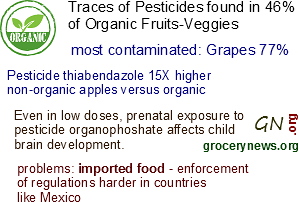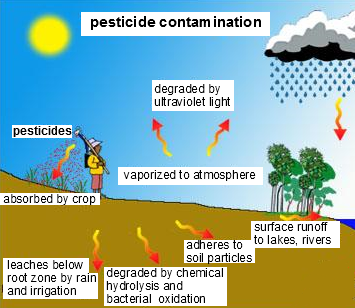Pesticide Residue On Food Becoming Problematic organic contamination
- Details
- seraphim
- Health and Nutrition
- Hits: 6867
most contaminated foods organic how contamination happens
Pesticide use is on the rise in North America and that's making contaminated food hard to avoid. Though the most toxic pesticides have for the most part been phased out, it's important to remember that for many years those pesticides were tolerated; As time goes by more of the long term effects become apparent.. Ultimately it is highly likely that many of the pesticides in use today will also be found to be too toxic and banned.
 Rules governing pesticide use (how it's applied/ soil testing/ food testing) in countries such as Mexico and Pakistan may not be as stringent as in developed countries like the United States and Canada.
Rules governing pesticide use (how it's applied/ soil testing/ food testing) in countries such as Mexico and Pakistan may not be as stringent as in developed countries like the United States and Canada.
With foods from more exotic destinations becoming increasingly popular with consumers, enforcing the pesticide maximum allowable levels is becoming harder to do. Fortunately grocery chains are growing their organic food offerings; over the last 3 years Carrefour nearly doubled the number of organic items being offered in its stores (2007: 1236; 2012: 1968).
Pesticide Exposure Likely In These Foods
Most contaminated fruits/veggies are: Apples, Peppers, Celery, Cherries, Grapes, Nectarines, Peaches, Pears, Potatoes
Lest contaminated: Asparagus, Avocados, Bananas, Broccoli, Cauliflower, Corn, Kiwi, Mangoes, Onions.
Organic Not Necessarily Pesticide Free
In Canada, a study found that 46% of organic fruits and vegetables showed traces of pesticides with 1.8% containing an amount that violates Canada's maximum allowable limits for the toxic s ubstance. Though this is much less than the 4.7% figure for non-organic foods it should still come as a surprise to consumers since organic products use their all-natural label as an excuse to charge higher prices.
ubstance. Though this is much less than the 4.7% figure for non-organic foods it should still come as a surprise to consumers since organic products use their all-natural label as an excuse to charge higher prices.
Pesticides Are Extremely Toxic
Pesticides are meant to kill living organisms. They are known to cause cancer, affects the endocrine and nervous systems. Even in low doses, prenatal exposure to the pesticide organophoshate can affect brain development.
How They Get There
Food contamination can happen via the water system, the soil, or even just through contact with other contaminated vegetables/plants.
notes
- Pesticide thiabendazole 15X higher on non-organic apples versus organic
- 77% of grapes sampled had traces of pesticides
